WL Central wrote on July 7:
NSA whistleblower Edward Snowden has now been offered asylum in three American countries: Bolivia, Nicaragua, and Venezuela. He has applied for asylum in six additional countries, according to WikiLeaks. And his chances for reaching a safe haven are growing further because of US interference in the process, according to Michael Bochenek, director of law and policy at Amnesty International.
-
-
The first McDonald's strike ever in Wellington took place on May 22. At 8am, five of the seven workers on shift came off the job and joined the picket line that had been set up outside Bunny St McDonald's. It was a noisy, lively affair, with Fightback member and Wellington Unite union organiser Heleyni Pratley leading the way with chants, songs and the occasional speech to the people passing by. Pratley explained why the strike was being held and why the public needed to respect the picket line.
-
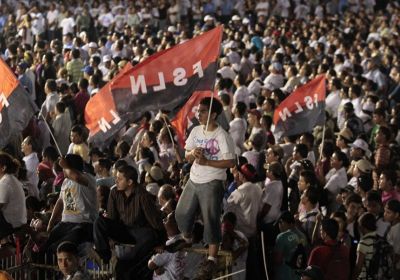 Nicaragua's President Daniel Ortega and a crowd of more than 100,000 people gathered on the night of May 2 in Managua's Plaza de la Fe to pay tribute to Tomas Borge. Borge, who died on April 30 aged 81, was the last surviving member of the group that founded the Sandinista National Liberation Front (FSLN) more than 50 years ago. Borge has always been and remains a symbol of the Nicaraguan Revolution in Latin America and beyond.
Nicaragua's President Daniel Ortega and a crowd of more than 100,000 people gathered on the night of May 2 in Managua's Plaza de la Fe to pay tribute to Tomas Borge. Borge, who died on April 30 aged 81, was the last surviving member of the group that founded the Sandinista National Liberation Front (FSLN) more than 50 years ago. Borge has always been and remains a symbol of the Nicaraguan Revolution in Latin America and beyond. -
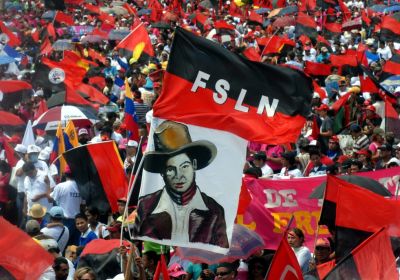 In a fit of petulant anger, the US government lashed out on January 25 against the outcome of Nicaragua’s recent presidential election. The leftist Sandinista National Liberation Front's (FSLN) Daniel Ortega was easily re-elected president and the FSLN won a majority in the National Assembly.
In a fit of petulant anger, the US government lashed out on January 25 against the outcome of Nicaragua’s recent presidential election. The leftist Sandinista National Liberation Front's (FSLN) Daniel Ortega was easily re-elected president and the FSLN won a majority in the National Assembly. -
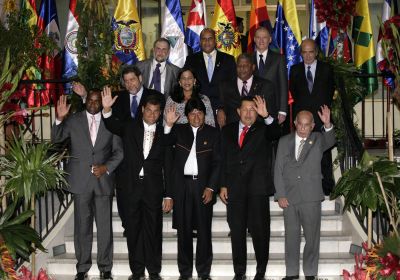 Seven years after being launched by the Venezuelan and Cuban governments, the Bolivarian Alliance for the Peoples of Our Americas (ALBA) has become an important voice on the global stage willing to stand up and denounce capitalism. ALBA has grown to include eight Latin American and Caribbean countries (Venezuela, Cuba, Bolivia, Ecuador, Nicaragua, Antigua and Barbuda, Dominica, Saint Vincent and the Grenadines.
Seven years after being launched by the Venezuelan and Cuban governments, the Bolivarian Alliance for the Peoples of Our Americas (ALBA) has become an important voice on the global stage willing to stand up and denounce capitalism. ALBA has grown to include eight Latin American and Caribbean countries (Venezuela, Cuba, Bolivia, Ecuador, Nicaragua, Antigua and Barbuda, Dominica, Saint Vincent and the Grenadines. -
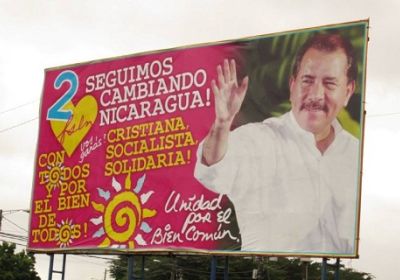 No one should underestimate the epoch-making election result in Nicaragua for the Sandinista-led Alianza Nicaragua Triunfa and its candidate Daniel Ortega. The result marks a return to levels of support for the Sandinista Popular Revolution last seen in Nicaragua's first ever democratic election in 1984. The Frente Sandinista de Liberacion Nacional (FSLN) and its allies have won more than 60% of the national vote. It is no surprise that the anti-democratic right-wing parties refused to accept their crushing defeat.
No one should underestimate the epoch-making election result in Nicaragua for the Sandinista-led Alianza Nicaragua Triunfa and its candidate Daniel Ortega. The result marks a return to levels of support for the Sandinista Popular Revolution last seen in Nicaragua's first ever democratic election in 1984. The Frente Sandinista de Liberacion Nacional (FSLN) and its allies have won more than 60% of the national vote. It is no surprise that the anti-democratic right-wing parties refused to accept their crushing defeat. -
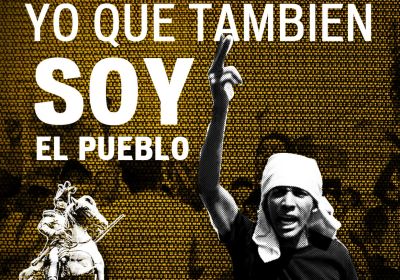 As Colombia launched its new offensive against Venezuela, an emergency summit of Central American presidents on July 20 restored Honduras to “its rightful” status. That status was lost internationally when former president Manuel Zelaya was overthrown in a military coup in June 2009. Using the pretext of the relaunch of the Central American Integration System (SICA), the presidents of Costa Rica, El Salvador, Guatemala and Panama agreed to reincorporate Honduras into the regional bloc and encouraged the Organisation of American States (OAS) to do the same.
As Colombia launched its new offensive against Venezuela, an emergency summit of Central American presidents on July 20 restored Honduras to “its rightful” status. That status was lost internationally when former president Manuel Zelaya was overthrown in a military coup in June 2009. Using the pretext of the relaunch of the Central American Integration System (SICA), the presidents of Costa Rica, El Salvador, Guatemala and Panama agreed to reincorporate Honduras into the regional bloc and encouraged the Organisation of American States (OAS) to do the same. -
While the Venezuelan government of socialist President Hugo Chavez has made headlines for its battle with ExxonMobil, Venezuela is not the only country under attack by the worlds largest oil corporation for refusing to submit to its dictates.
-
More than six months have passed since the inauguration of the new 21st Century Sandinista government of Nicaragua after Daniel Ortega of the Sandinista National Liberation Front (FSLN) assumed the presidency in January. Jubilant celebrations of that event expressed the excitement of hundreds of thousands of Sandinista supporters. New hopes for an escape from the hell of neoliberal catastrophes breezed across our countrys mountains, volcanoes, valleys and lakes, from the large cities to the remote hinterlands and coasts.
-
Nicaraguas Sandinistas will never forget the night of November 5 and the four days of street celebrations that followed. The first official results of the election came in around 11pm. They foretold that Daniel Ortega, presidential candidate of the Sandinista National Liberation Front (FSLN), would win on the first round. Partisans of the Sandinista movement, which led the popular revolution of 1979, had waited 16 long, trying years for this day, ever since the Sandinista government went down to bitter defeat in February 1990.
-
Despite a relentless campaign by the Bush administration to derail his election, Sandinista leader Daniel Ortega won Nicaragua’s November 5 presidential election.